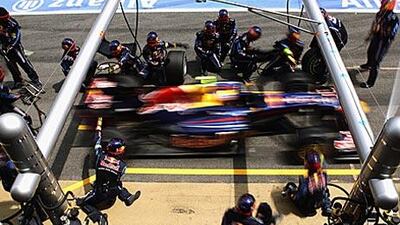BARCELONA // The pace was utterly relentless four drivers on the limit throughout the afternoon but the Spanish Grand Prix was effectively settled within moments of the start. Mark Webber repelled a three-pronged challenge into turn one and was never seriously threatened thereafter.
It was the Australian's first victory of the campaign, Red Bull-Renault's second and the 10th time in as many years that the corresponding fixture has been won from pole position. Webber got away smartly enough, but Sebastian Vettel, his teammate, immediately tucked into the leader's slipstream and the duo came under simultaneous pressure from Lewis Hamilton (McLaren) and Fernando Alonso (Ferrari), both of whom had a straightline speed advantage.
Webber managed to keep the door closed, however, and Vettel was protected when the others briefly slowed each other into turn one. It was to be the afternoon's liveliest, and most important, exchange. "There's a long run to the first corner here," Webber said, "and we had some pretty quick cars just behind us. "It was important to get cleanly through turn one and once I'd done that I just concentrated on settling into a rhythm.
"I controlled the gap to the cars behind, looked after the tyres and then just did what I needed to bring the car home. "It wasn't easy to drive at the start, on full fuel, but the fact I was able to pull away put me in good heart." Vettel remained his closest challenger until drivers made their first stops, but the German then lost time with a jammed wheel nut and consequently dropped behind Hamilton, who was able to run at a similar pace to Webber, although he was never close enough to mount a serious challenge.
Even so, the 2008 champion seemed set for a safe second place until the penultimate lap, when he skated into the turn three tyre wall after his front left tyre deflated. Martin Whitmarsh, the McLaren team principal, said: "It looks as though a bit of debris might have become trapped behind the wheel and worn away the metal, which possibly caused the rim to break. It was a tyre deflation, not a tyre problem."
By that stage Vettel had suffered further difficulties of his own: a delaminated front right brake disc caused him to slide off the road on lap 54 and he subsequently pitted for a check-up. The team fitted fresh tyres and sent him back out, but he was told to nurse his brakes to the end. The supplementary stop dropped him to what eventually became third, following Hamilton's demise, behind Alonso, the local favourite.
"I'm delighted with second place," Alonso said, "and it was an unexpected bonus to gain two positions in the closing stages. For all that it's a good result, though I have to accept that our performance has been a bit so-so and we know we still have to improve." Michael Schumacher finished fourth, the best result so far during his comeback campaign, and he managed to keep Jenson Button, the world champion, at bay from lap 16, when the Englishman made his tyre stop, to the end of the race. He was fortunate, though, that a dragging clutch delayed Button in the pits and allowed him to move ahead.
The McLaren was potentially much faster but, as is customary in Barcelona, there was no way through despite the superior straightline speed of his car, which allowed him a number of runs at Schumacher into the first corner, though none were successful. Fifth place was, though, enough for Button to retain his world championship lead, three points clear of Alonso. Felipe Massa, who was outpaced all weekend by his Ferrari teammate, finished a distant sixth, although his cause was not helped when he bent his front wing against Karun Chandhok's lapped HRT at one-third distance. sports@thenational.ae

